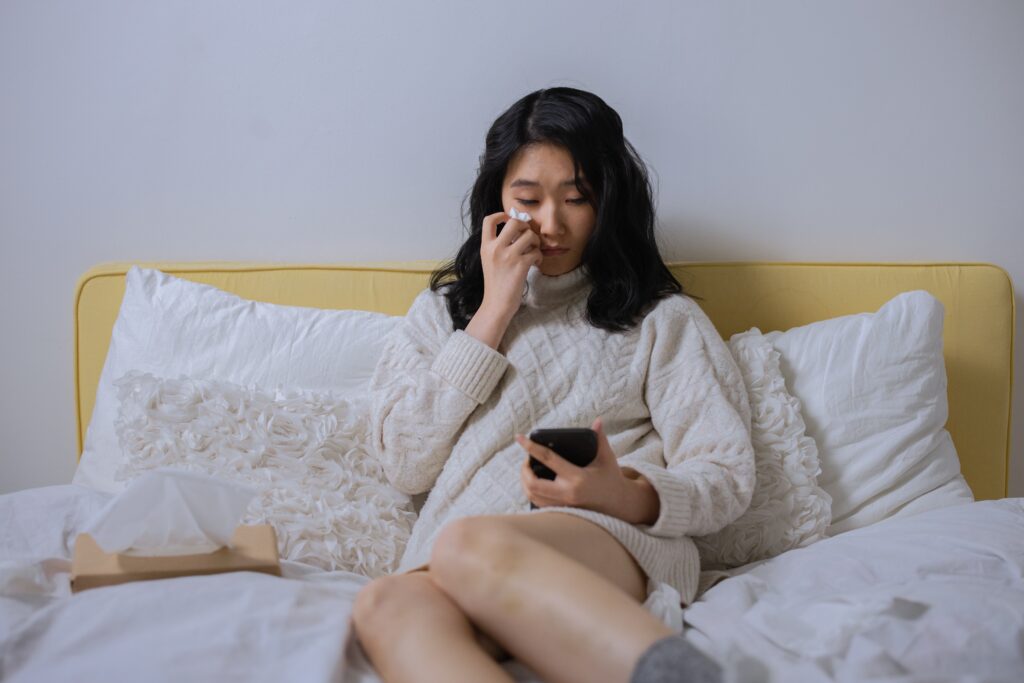How often do you compare your size, shape, or certain parts of your body with others? With so much pressure to have the ‘perfect’ body, is it any wonder that we struggle to feel confident in how we look?
Our TVs and social media feeds are filled with adverts and images of an aspirational lifestyle that leaves us feeling inadequate, and thinking that if our bodies were perfect, we’d have more confidence.
When things don’t go the way we want them to, we believe we’ll never measure up. And so begins the cycle of the negative body image, of believing that our bodies are a direct reflection of our self-worth.
The thing is, a negative body image goes a lot deeper than striving to look like everyone else. Let’s look at what body image is, the things that trigger you into feeling like you’re not good enough, and discover the real solution for overcoming negative body image.
What is Body Image?
Your body image is effectively how you view/feel about yourself. Your perception of your own body image is influenced by a number of factors including what you see when you look in the mirror, how you feel about certain parts of your body, social comparison, and your past.
Body Image Triggers
What is it you dislike about yourself? Do you feel like you need to lose weight, or have a flat stomach? A pert behind or perkier breasts? A smaller nose, or leaner legs?
Whatever it is that you wish you could change, it might surprise you to hear that changing your physical appearance won’t automatically lead to a positive body image. Because how you perceive yourself can be influenced by a number of factors, including the perceptions you’ve grown up with and your daily habits.
Let’s look at some of the most common triggers for a negative body image.
Your Mood
Do you have days where you feel pretty good about your appearance, and others where you hate the way you look? Your mood – and how you feel in any given moment – can significantly influence how you perceive your body image.
If you’re already prone to putting yourself down, negative emotions such as anxiety or stress can make it even harder to feel positive about how you look. And when you’re stuck in a negative thinking pattern, it’s easy to become fixated on your perceived flaws and imperfections.
However, when you’re feeling on top of the world, and are feeling happy and confident, you’re much more likely to feel satisfied with your appearance.
Social Media
When you like to spend a bit of time scrolling through your social media news feed as a way to chill out, there’s nothing worse than seeing other women living their ‘best’ lives, with their ideal bodies, to trigger those negative body comparisons.
Social media can be a big contributing factor when it comes to a negative body image. These images of perceived ‘ideal’ bodies leave you feeling inadequate and insecure. But what’s easy to forget is that these images are often edited and filtered, and therefore portraying unrealistic beauty standards that are nearly impossible to achieve. It creates a distorted view of what a ‘normal’ body looks like.

To make matters worse, the more you engage with (like, comment, or even just read) such content, the more you will see it, thanks to the platform’s algorithm. When you spend any amount of time on these posts, it thinks you are interested in this type of content, so will continue to serve it up in your feed. It creates a vicious cycle, reinforcing those feelings of inadequacy and further aggravating your own negative body image.
Research shows that the more time you spend on social media the higher your level of body dissatisfaction will be. In addition it can increase your likelihood of engaging in poor eating habits, feelings of low self-esteem, anxiety, and depression.
Perhaps take some time to consider how your social media consumption affects you. If you are negatively impacted by the type of content you consume, it might be worth taking some time out and having a social media detox.
Your Experiences and Environment
Your past experiences and current environment can significantly influence your body image.
Think about when you were little. How did your family talk about their bodies? What beliefs and behaviours did you pick up from the people around you? Were you bullied about your appearance in school?
Growing up in an environment where appearance is highly valued can create the belief that you must look a certain way. This can create an unnecessary pressure to conform to those ‘standards’.
Additionally, places we hang out in such as gyms – which place emphasis on physical appearance – can create pressure to conform to specific beauty standards, or engage in behaviours that aren’t always healthy for us.
Any past trauma or abuse may also be a contributing factor of a negative body image. In the case of significant trauma or abuse, my advice is to always seek professional support.
Your Beliefs
It’s important to remember that any negative beliefs you hold about yourself aren’t your fault. However, when these beliefs impact your ability to accept your body and its unique beauty, it’s up to you (and is entirely within your power) to change those beliefs and learn to love yourself as you are.
Let’s say for example that you believe being thin will make you beautiful, or that your self-worth is based on your appearance/how you look. Being unable to measure up to these (often impossible) standards can lead you to feel inadequate – or not good enough – and can lead to a negative body image.
This can cause distortions in your self-perception, and can lead to a constant cycle of unhelpful thinking habits.
Your Daily Habits
Your daily habits have a significant impact on how you feel about your body.
Any habits that reinforce your negative beliefs about your body can contribute to a negative body image. These daily habits might include:
- Disordered eating habits
- Excessive exercise
- Negative self-talk
- Social comparisons
- Lack of self-care
Practising self-care and self-acceptance are critical when it comes to building a positive body image. I know that seems easier said than done, but I also know that it is possible, because I’ve been there.
Negative Body Image – Signs and Symptoms to Look Out For
Research conducted by Dove Beauty revealed that 71% of women just like you experience body dissatisfaction. The impossible beauty standards we are presented with everyday create a dangerous link between our self-worth and physical appearance. In turn, this can lead to the desperate need to try and control and change our bodies.
The relentless daily battle can feel exhausting and takes its toll on your physical, mental, and emotional well-being.
If this is you, know that you’re not alone. Let’s look into 8 signs of a negative body image.
1. Body Checking
Constantly scrutinising and evaluating your body can show up as excessive mirror gazing, pinching or measuring body parts, or taking frequent progress photos. This behaviour reinforces negative body image and self-criticism.
2. Extreme Dieting
You might go on restrictive diets, severely limiting your calorie intake or cutting out entire food groups. This approach can lead to nutrient deficiencies, disordered eating patterns, and a negative impact on your physical and mental health.
3. Obsessive Calorie Counting
Constantly tracking and monitoring caloric intake can become an unhealthy obsession. It can lead to an unhealthy relationship with food, increased anxiety, and a loss of enjoyment in eating.
4. Over-Exercising
Excessive exercise can be used as a means to control weight and body shape. You may push yourself beyond your limits, ignoring your body’s need for rest and recovery. This behaviour can lead to physical injuries, exhaustion, and an unhealthy fixation on exercise.
5. Comparing Yourself to Others
Comparing your body to unrealistic beauty standards and filtered images on social media significantly impacts your body image and can lead to unhealthy behaviours to try and meet them.
6. Seeking Validation from Others
Relying on external validation and seeking approval from others can be emotionally draining, contribute to a negative body image and create a reliance on others’ opinions for self-worth.
7. Cosmetic Procedures
Perhaps you’ve considered cosmetic procedures as a way to alter your appearance and regain a sense of control. While cosmetic procedures are a personal choice, using them as the sole means to address body image concerns without addressing underlying emotional and psychological aspects can be problematic.
8. You Try and Hide Yourself
The constant desire to try and hide yourself or make yourself invisible is a key indicator of a negative body image. For example, perhaps you always choose darker or looser clothes, like oversized hoodies and comfy pants.
You may try to avoid social situations because you can’t bear the thought of people looking at you. You might miss parties, cancel get-togethers or fail to speak up in groups because the thought of attention fills you with horror. This can take a toll on your mental health and stop you from growing and pursuing the things you truly desire.
The Effects of Negative Body Image: Why is Body Checking so Harmful?
Negative body image has been associated with increased anxiety and depression, the onset of eating disorders and obsessive exercise. The more you concentrate on perceived flaws, the more dissatisfied you become with your body. The impact on everyday life is significant, impacting various aspects of your life and wellbeing.
Decreased Self-Esteem
Obsessive body checking heightens your focus on perceived flaws and imperfections, significantly impacting your self-esteem. Continually scrutinising your appearance reinforces negative beliefs about yourself and undermines your confidence.
Increased Self-Consciousness
Engaging in obsessive body checking makes you hyper-aware of your looks, leading to heightened self-consciousness. This discomfort and anxiety can arise in social situations, as you constantly worry about how others perceive you.
Emotional Distress
Obsessive body checking leads to emotional distress, including feelings of sadness, frustration, or even anger. Constantly comparing yourself to unrealistic standards or striving for an unattainable “perfect” body takes a toll on your emotional state.
Relationship Strain
Preoccupation with body checking strains relationships, causing social withdrawal, avoidance of activities, or excessive self-criticism. This strain can lead to feelings of isolation, loneliness and lack of connection.
Time And Energy Drain
Obsessive body checking is mentally and emotionally draining, consuming significant time and energy. This leaves less room for you to take part in meaningful activities, hobbies, or self-care practices.
How Do You Overcome a Negative Body Image?
Becoming aware of how body image impacts you emotionally and mentally is crucial for taking steps towards a more positive mindset and accepting the numerous amazing qualities that define who you truly are.
It is possible to overcome a negative body image by becoming self-aware and taking practical steps, which we’ll look at below.
1. Become Self-Aware
We have so many thoughts throughout the day that we’re not always aware of them, and this can apply to our body checking, too. You might check your body in the mirror first thing in the morning out of habit, without even thinking about it. And what you see can make or break how you feel for the rest of the day.
Try this – It’s worth keeping a journal or a thought log to try and catch these moments – pay attention and write it down so that you can begin to see patterns. Becoming aware of our behaviour is one of the first steps to making change.
2. Challenge Negative Thoughts
While you’re in the habit of paying attention to your thoughts, challenge them. Are they true? Self-criticism can make everything in our life seem bad. The truth is, your worth extends far beyond your appearance. Choosing to focus on your positive qualities, talents, and achievements can help counteract this negative cycle and turn these thoughts on their head.
Try this – Create a list of affirmations or positive statements about yourself and your body. Whenever negative thoughts arise, replace them with these positive affirmations as a reminder of your inherent worth.
3. Focus on Your Overall Wellbeing
Taking a holistic approach to your health can really help to overcome a negative body image. A focus on your mental, emotional and physical wellbeing nurtures both your mind and body, therefore creating a deeper, more meaningful relationship with yourself.
Try this – Make a list of activities that make you feel good about yourself and start dedicating time for these on a regular basis. Focus on the joy and fulfilment they bring rather than how you look during or after those activities.
4. Limit exposure to Triggers
Take steps to reduce exposure to situations or environments that tend to trigger body checking. This might involve unfollowing social media accounts that promote unrealistic beauty standards, avoiding places with excessive mirrors, or adjusting the way you consume media.
Try this – Go through your social media accounts and curate your feeds to include body-positive influencers or content creators who celebrate diverse bodies. Surrounding yourself with positive and inclusive messages can help counteract the negative influence of societal beauty ideals.
However, also make sure you aren’t solely following content based on ‘bodies’ – diversify your feed for other positive and inspirational messages, accounts that make you laugh and those that align with your values and hobbies.
5. Surround yourself with Positive Influences
Another helpful step is to surround yourself with individuals who support healthy habits and encourage you to be yourself. By seeking out positive influences, you can create a positive environment that promotes self-acceptance and self-love.
Try this – Seek out people who lift you up and celebrate you as a whole. Create a safe, nurturing space where you can practise self care, develop self-acceptance, and focus on things that make you feel good.
6. Seek Support
It’s essential to reach out to trusted friends, family members, or professionals who can provide guidance and support on your journey toward developing a healthier body image.
Try this – Seek out communities or online forums that promote body acceptance and provide a safe space for sharing experiences and seeking support, such as my Self Esteem Society. Engaging with others who have similar struggles can provide support, encouragement and valuable insights.
7. Be Patient
Patience is key as you navigate the journey of relinquishing control. It’s important to acknowledge that change takes time and progress occurs in small steps. Understand that setbacks are a natural part of growth. Celebrate small victories and milestones along the way, recognising that progress is not linear. Embracing patience allows you to cultivate resilience and persevere through challenges.
How to Heal a Negative Body Image – Start Taking Back Control
If you’re wondering whether body image issues ever go away, you’ve already taken the first step. Recognising the signs of a negative body image is the first step towards a transformative journey of self-acceptance and self-love.
Life is a journey to be treasured, and we want to grow and look back on times of joy and cherished memories of love and adventure.
But I also know that letting go of control is a gradual process; I know how overwhelming and anxiety-inducing it can be. I worked hard to develop self-acceptance, embrace mindfulness and create positive habits so that I can share them all with you.
The Roadmap to Body Confidence and Self-Love
If you’d like to be one of the first to get your hands on my brand new workbook that encompasses everything you need to overcome your negative body image, click the button below to find out more.
In the meantime, check out the library of free resources. If you would like to consider 1-2-1 coaching, click here to book a free 30-minute chat to talk about your struggles.

Hey I’m Natalie, Supporting women like you on their road to self-acceptance and building a positive body image.

View comments
+ Leave a comment